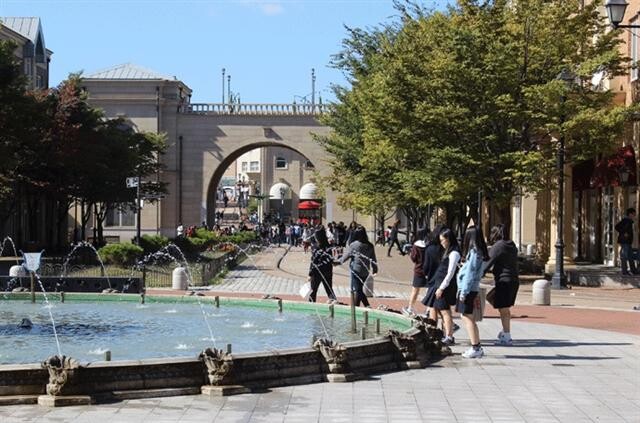hankyoreh
Links to other country sites 다른 나라 사이트 링크
Money-eating English village to shut its doors

An English village in Gyeonggi Province that ushered in a wave of similar establishments around the country has begun procedures to close down - unable to withstand twelve years of accumulated red ink and changes in the educational environment with the arrival of online education.
On May 28, Gyeonggi Province, the Ministry of Education, and two other agencies held a ceremony for an agreement that would turn the English village in Paju into an institution for training creative minds.
While the province insisted that the English village program “isn’t going anywhere right away,” Gov. Nam Kyung-pil did say that a shutdown was “the aim.”
At a Provincial Council general session on May 11, Saenuri Party member Kwon Mi-na (Yongin-4) inquired about plans to shut down the English village, which had previously become the focus of “management rationalization” efforts.
Her question prompted Nam to ask in return whether it was “right in this day and age to operate such a large institution for English education in the public sector.”
“I don’t think so,” Nam added.
The Gyeonggi English village was one of the top pledges made by then-governor Sohn Hak-kyu in 2002, when he was affiliated with the New Korea Party (a precursor to today‘s ruling Saenuri Party). In 2004, the province spent around 8.5 billion won (US$7.1 million) to open an English village as a camp in Ansan. The Paju village, which measures around 278,000 square meters, was opened in Apr. 2006 at a cost of around 99 billion won (US$83.1 million). Another in Yangpyeong was opened that same month at a cost of 67.6 billion won (US$56.8 million).
Offering the opportunity for short-term experience-based English learning without traveling overseas, the English village model proved popular enough for 22 total to be established nationwide. Early on, prospective customers had to wait several weeks even with a reservation. Buoyed by the response, Gyeonggi Province at one point openly weighed adopting English as a “second official language.”
But a failure to foresee the future a decade down the road turned English village policy into a burden for the province. In 2012, the Ansan camp closed its doors after eight years. Over that time, it had amassed millions in debt - 11.8 billion won (US$9.9 million) in its first year alone. The fate of the Yangpyeong village, entrusted to SDA Language Institute with its 2008 opening, is set to be decided after the commission period ends on Dec. 2.
So how did this happen?
“Now that online private English education has become possible, there is less need for experience-based English education,” suggested a Gyeonggi Province source. “Instead, there’s a greater need now for the creative intelligence-based education of the future.”
But the real reason looks to be the red ink. Gyeonggi Province spent a total of 175.1 billion won (US$147.0 million) setting up its three English villages. For the Paju village alone, it suffered losses ranging between 1.4 billion and 6.3 billion won (US$1.2-5.3 million) every year between 2008 and 2015, for a total deficit of 21.9 billion won (US$18.4 million). The resulting financial strain was severe, with 25.4 billion won (US$21.3 million) spent to make up the difference.
“After sinking about 200 billion won into its English villages and patting itself on the back without taking into account the local government’s educational demand, the effects, or financial conditions, Gyeonggi Province is now hard at work trying to paper over it, without anyone taking responsibility for the policy failure,” said Park Ok-bun, a proportional representation member of the Provincial Assembly for the Minjoo Party of Korea.
By Hong Yong-duk, south Gyeonggi correspondent
Please direct questions or comments to [english@hani.co.kr]

Editorial・opinion
![[Editorial] Intensifying US-China rivalry means Seoul must address uncertainty with Beijing sooner than later [Editorial] Intensifying US-China rivalry means Seoul must address uncertainty with Beijing sooner than later](https://flexible.img.hani.co.kr/flexible/normal/500/300/imgdb/original/2024/0517/8117159322045222.jpg) [Editorial] Intensifying US-China rivalry means Seoul must address uncertainty with Beijing sooner than later
[Editorial] Intensifying US-China rivalry means Seoul must address uncertainty with Beijing sooner than later![[Column] When ‘fairness’ means hate and violence [Column] When ‘fairness’ means hate and violence](https://flexible.img.hani.co.kr/flexible/normal/500/300/imgdb/original/2024/0516/7417158465908824.jpg) [Column] When ‘fairness’ means hate and violence
[Column] When ‘fairness’ means hate and violence- [Editorial] Yoon must stop abusing authority to shield himself from investigation
- [Column] US troop withdrawal from Korea could be the Acheson Line all over
- [Column] How to win back readers who’ve turned to YouTube for news
- [Column] Welcome to the president’s pity party
- [Editorial] Korea must respond firmly to Japan’s attempt to usurp Line
- [Editorial] Transfers of prosecutors investigating Korea’s first lady send chilling message
- [Column] Will Seoul’s ties with Moscow really recover on their own?
- [Column] Samsung’s ‘lost decade’ and Lee Jae-yong’s mismatched chopsticks
Most viewed articles
- 1Celine Song says she’s gratified global audiences have responded to the kismet of ‘inyeon’
- 2[Editorial] Transfers of prosecutors investigating Korea’s first lady send chilling message
- 3[Exclusive] Unearthed memo suggests Gwangju Uprising missing may have been cremated
- 4Highly educated high-earners at risk of being replaced by AI, BOK study says
- 5[Column] US troop withdrawal from Korea could be the Acheson Line all over
- 6Xi, Putin ‘oppose acts of military intimidation’ against N. Korea by US in joint statement
- 7For new generation of Chinese artists, discontent is disobedience
- 8Truth commission confirms Korean War killings by soldiers and police
- 9USFK sprayed defoliant from 1955 to 1995, new testimony suggests
- 10[Column] “Hoesik” as ritual of hierarchical obedience